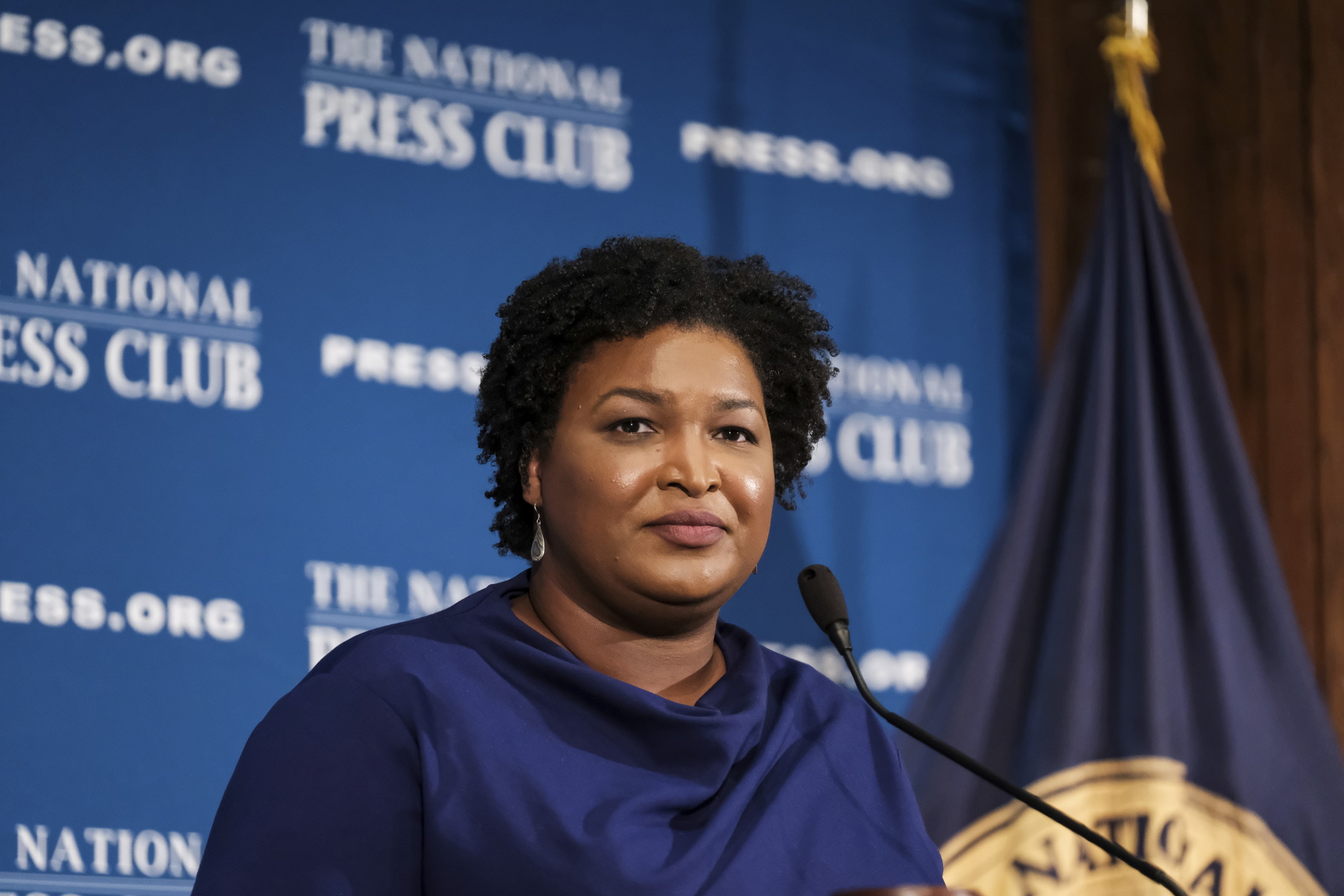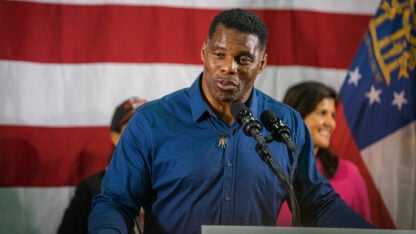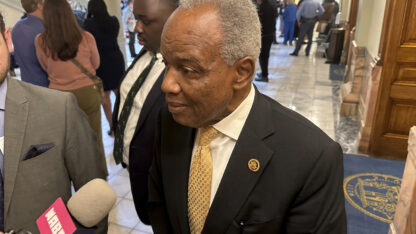Democrat Stacey Abrams founded the organization Fair Count to ensure an accurate count of Georgia’s population in the 2020 census. But she didn’t anticipate advocating for a fair count during a global pandemic.
WABE’s Roxanne Scott spoke with Abrams about the stakes of the once-a-decade count, why her organization is serving as a census watchdog and the message she tells people who are still unsure about filling out the questionnaire.
This interview has been edited for length and clarity.
Can you talk about how the census connects to voting, and why some people may believe that the census is as important as voting.
So the census does two things. It allocates political power and financial power. And both of those are instrumental in the question of voting. On the political power side, it reallocates the 435 congressional members through what’s called reapportionment. It also sets the decision-making for the political lines that will be drawn in 2021. For everything from our school boards, our county commission, city council all the way up to our state legislative races and our congressional races.
Those lines matter because either the lines will be drawn so politicians can pick their voters, or they can be drawn so that voters get to pick their leaders. And when reapportionment is done properly, the states that get increased population get more support in terms of congressional members. And states that have less population, they lose members. But with redistricting, the lines that get drawn decide if you get included in the decision-making of your neighborhood. Because if you draw the lines to split communities of interest, to push people of color out, or to pack them in together, you either consolidate or you dilute their power, and that is a dangerous thing.
But the other part of the census is the money. And we have to remember we don’t vote simply for the sake of voting, we vote so that we can demand what we need for our communities. And the census controls $1.5 trillion worth of investment. We know in Georgia we had an undercount in 2010 that has affected us for the last decade.
If you do not count, if you’re not included in the census, you lose political power, and you lose economic power.
The last thing I’ll say is this. If you think about it this way, it’s like being invited to a party. If you RSVP, you get a good seat, you get good food, you get to enjoy it. If you don’t RSVP, if you’re not counted, you’re going to be in the garage with a bologna sandwich wondering what’s going on inside. That’s what’s happening when we don’t include ourselves in the census. And that’s why it’s connected to voting because it’s how we decide what our futures look like.
You mentioned that we use the census for reapportionment and redistricting. Who else besides the government uses census data?
Census data is used not only by the government for politics, it’s used to allocate that $1.5 trillion for more than 300 programs, including Pell Grants if you’re a college student, or SNAP benefits if you rely on them. It’s part of how the funding for roads and bridges are allocated. If you’re a business, you often use census data to decide if you’re going to bring jobs to a community.
But it also determines things as small as whether a grocery store comes. I’ve heard the story from a census advocate who talked about a community that had been trying to get a grocery store for years because they lived in a food desert, and they finally thought they had a shot. But they missed out because they were missing the 40 people in their census count that would’ve allowed them to hit the threshold. They had more than 400 people who didn’t get counted. And because of that undercount, they lost out on having access to fresh food. It’s as small as things like that and as large as whether or not you have the health care you need to survive.
Fair Count is one of hundreds of organizations that joined a civil rights coalition that’s going to serve as a watchdog for the census to ensure that the data won’t be shared, and that it’s going to be safe. By law, individual census data cannot be shared for 72 years. Why was it important for Fair Count to join this coalition?
We don’t trust the Trump administration to abide by the law because they have signaled their willingness to flout the law and to be untruthful and unethical in their behavior. And we need people to be counted, because regardless of who the president is today, the story of the census is a 10-year story.
And if people refuse to respond because they’re afraid or because they are legitimately suspicious, then we lose access to resources for communities that desperately need that access and that desperately need that investment. So we were proud to join that coalition because we believe the information will be safe if we have the right leadership. But we want to put the current leadership on notice that they cannot misuse this information. And they cannot use it to abuse the communities in the United States.
Before the pandemic, what were some strains already on the Census Bureau to make sure that they could conduct an accurate and fair count?
The Governmental [Accountability] Office, GAO, last year flagged the Census as one of the critical things to watch because it was underfunded; it was underfunded by billions of dollars. The testing that was supposed to happen wasn’t happening. The hiring of enumerators had been slowed down by the underfunding, and so we knew from the very beginning of 2019 that completing the census process was going to be difficult in the country, especially for those hard-to-count communities.
But what we’ve tried to do is not simply bemoan the fact that this is going to be a problem. We’ve tried to step in and support communities not only in Georgia, but we are operating in Mississippi, Alabama, Louisiana, Florida, North Carolina, South Carolina, as well as other communities and other states. We know that the Census Bureau has the best intentions, but we know they’ve been underfunded, and that this pandemic has dramatically altered their timeline.
There have been delays now in hand-delivering the census forms to rural communities. That’s one of the processes that was built in because it’s hard for rural communities to respond online or by phone.
However, what we’re trying to do is make sure people have all the information they need, that they can go online and get information in 13 different languages; that they can call and get information in those different languages. And they can get guides in 59 languages. There are solutions to every problem, but we have to be committed to acknowledging the problems that are both created by the federal government and exacerbated by state inaction and be responsible for getting the census done anyway.
For someone who’s on the fence about filling out the census. They hear these benefits. They hear the money that can come to their communities, but like you said earlier, some people do not trust this [Trump] administration. What is your message to them?
OK, three things. No. 1, if you have a utility bill or cellphone, they already know how to find you. Filling out the census simply means you get your money and your political power from doing so. Because knowing who you are is not enough, they need to know about you. That’s why they ask questions about your income, about your race and ethnicity, about where your community is, because you live in one house. But the people around you have different needs, and we need all of those needs to be taken into account. So No. 1, they already know how to find you; get your money, get your political power.
No. 2, as you pointed out, the data is confidential for 72 years. I’m 46 [years old]. I still haven’t seen my name on the census and I won’t for quite some time.
No. 3 is this. We know that it’s not just about who we are. It’s about who we want to be. The communities that don’t respond to the census — they continue to struggle. And in fact, the struggle gets worse. Communities that respond to the census, they get better, they get stronger, they get more. If we want to close the racial economic inequality gap, if we want disadvantaged communities to be seen and heard and represented, if we want our country to be as strong as possible, we are not only responsible for ourselves. We’re responsible for those who need our help, not just today, but in the future.
And so do it because it’s safe, do it because it’s free, and do it because it sets the tone for the rest of our decade. And I say this, if you don’t get counted, you will not count, and we deserve our power.









